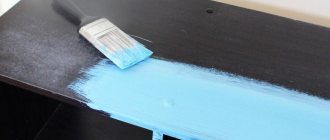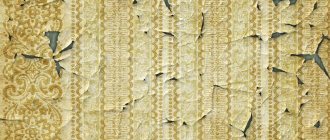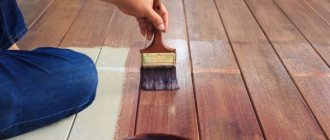Over time, wooden chairs have ceased to be a common element of the interior. Nowadays they are often used as decoration, a design highlight. These pieces of furniture create a special atmosphere in the room, attract attention, and indicate the owner’s sense of taste and style. However, what if they don’t look presentable at all? Even if old wooden chairs have lost their original appearance, they do not need to be thrown away. You can breathe a second life into them. What will it take? Read how to paint a chair yourself and take advice from professionals.
Choosing paint and tools
To ensure that painting a stool or chair does not cause unnecessary problems, you should take care of purchasing high-quality paint and varnish solutions, especially if you are painting for the first time. Choosing paint is a difficult process that should be taken very seriously.
The choice of paint is dictated by the material of the furniture. The chair can be made of wood, metal, plastic, or a combination of several types (for example, a plastic chair with metal legs). You can buy specialized paints for wood, metal or plastic, but since there is no fundamental difference in the composition of the paint, the following tips for choosing paint will be useful in any case.
You can paint a chair or stool with the following finishing product:
- aerosol paint in cans (best suited for metal);
- acrylic paint in a jar (best on wood);
- alkyd paint in a can (fits equally well on any surface).
For beginners, the traditional painting method is best - with a roller, so first you should work with regular paints in a spray can.
One more thing: try to choose between water-based paints. This will protect the chair from moisture, extending its service life.
To preserve the texture and only as an additional protective layer, it is recommended to purchase a varnish coating. Polyurethane-based furniture paint is designed to protect the surface from abrasion and various negative influences, especially if the chair is often outside the home. In addition, the painted surface is easy to clean.
The set of working tools depends on the painting method. In addition to those used to pre-treat surfaces, this process directly involves the use of brushes of various sizes, a narrow roller and a spray gun or spray gun.
Recommendations for coloring
The final and most important point - painting the chair
It would seem that the stages of preliminary preparation of the surface of the chair take so much time that there is practically no desire or energy left to further carry out the main action - painting. But worries are unnecessary, because the hardest part is already behind us.
So, let's proceed to the stage of painting the stool or chair. Here, too, it is worth considering a couple of recommendations:
- A cloth is spread on the floor, and nearby household items are covered with oilcloth. If there are decorative elements on the furniture itself that are not planned to be painted, they should be sealed with masking tape.
- The paint needs to be stirred properly. Prepare a paint brush of a suitable size. For ease of painting, it is best to turn the chair upside down.
- Apply the first thin layer, treating all hard-to-reach areas. Leave temporarily until completely dry.
- Walk over the surface with fine-grained sandpaper. Wipe with a damp cloth.
- Apply a second coat of paint. Let it dry.
- Painting in cans uses the following technology: the aerosol is shaken and applied in several thin layers to prevent smudges. The spray gun will significantly speed up the work process.
- Finally, the chair is coated with two protective layers of clear varnish using a small paint brush at intervals to allow the previous coating to dry.
After 24 hours, you can check the readiness of the stool. If the paint does not stick to your fingers, it means the furniture is ready for use.
Even the biblical King Solomon said that there is nothing better than the opportunity to enjoy the fruits of one’s labor. When an exclusive piece of furniture - a hand-painted chair or stool - decorates the apartment with its very appearance, only then will a clear realization come: the effort spent was worth the joy of owning this original work of art!
How to paint a chair
By changing the color of the chair and repainting it, you can completely change its style. Here we will turn an ordinary old wooden stool (and you can probably find one in almost any home) into a stylish element of the apartment interior.
What paint to paint a wooden chair
Any wood paint, from enamel to alkyd or acrylic.
- Acrylic paint: May fade over time and leave streaks when wiped with a damp cloth. BUT no smell.
- Enamel and alkyd paints have a strong odor, so it is best to paint in a ventilated area. But they are waterproof and won't wear out!
How to paint a chair: Large surfaces, such as a roller seat. And here are the stool legs with a small tassel!
Step-by-step painting technology:
Necessary materials:
- Old wooden stool
- Sandpaper
- Paint (dark for seat and white for legs)
- Brush
Step 1: Sanding the Chair
First you need to sand the wood with sandpaper to remove old paint and level the surface.
DIY designer furniture: beautiful and inexpensive
Do you have furniture at home that is already out of fashion or has lost its attractive appearance? Don't rush to throw it away. It is quite possible that it will become a designer accessory that will decorate the room. Use our tips, and painting chairs at home in your own house or apartment will not be difficult at all.
Nowadays the trend is to update old furniture; this gives your favorite things not only a new look, but also brings significant savings. Most often, wood furniture undergoes such changes using paint to update it. However, not everyone knows how to paint wooden furniture and what kind of wood paint should be, and because of this alone they refuse to consider this restoration option. Let's figure it out.
Types of paints for wood
Builders joke that wood can be painted with almost any paint. Indeed, only a small list of tools is not suitable for this. Therefore, paint for wooden furniture is divided according to the type of coating and its properties.
Varnishes, impregnations, stains
These are both colorless substances and coloring pigments. They allow:
- emphasize the structure of the wood without painting it;
- the product “breathes”, absorbing / releasing moisture into the room;
- protect the product from negative environmental influences, such as burnout
You should paint new or well-preserved furniture. Such products will fit perfectly into an interior in a classic or eco-style. It is also important that in the future for a new modification it will not be necessary to remove the paint, it can be updated from above.
Dispersion paints
Painting wooden furniture with water-soluble compounds is now very popular. The water in them is a solvent, and the binder is a polymer resin. Such popularity is not surprising, because most often it is odorless paint, which makes it indispensable for children's furniture.
It is also important that it dries quickly, is waterproof and vapor-tight. When working with it, you should not be afraid of the release of harmful substances. A large selection of colors will allow you to choose your unique color. The coating can be matte or glossy.
It's a pleasure to paint your product. This group also includes acrylic paints, which are characterized by increased durability and all the other advantages of water-based paints.
Organic solvent-based enamel and paint
This paint for wooden furniture is less popular now, but literally 5-10 years ago it had no equal. And the reason for its unpopularity is toxicity, fire hazard, unpleasant odor and long drying time. An undoubted advantage is the low price, especially compared to acrylic paints.
After drying, a layer is formed on it that protects the product from high humidity. For this reason, it is often used to decorate rooms and furniture that may often come into contact with water.
Important! The protective water barrier prevents the product from “breathing.” To use such a varnish, the wood must be completely dry, otherwise peeling and bleeding of the varnish cannot be avoided.
Chair Painting Ideas
Painting your chairs a different color is the most versatile way to make them look modern and elegant. Below in the photo we have given several ideas for decorating chairs.
Restoration process: step-by-step instructions
Stages of work. To update old chairs and stools, you need to follow these steps:
- wash the furniture, dry it, degrease it with a solvent (for example, White Spirit);
- carefully disassemble the object (if possible) into parts using a screwdriver or screwdriver;
- remove old paint by scraping;
- clean the wooden surface, seal grooves, cracks, prime;
- After drying, wipe with a cloth; a stain may remain;
- paint (varnish) elements;
- sandblasting after drying;
- if necessary, repaint with varnish;
- wait until completely dry, assemble the furniture.
Before staining, it is necessary to check the condition of the stool. If it has been idle for a long time or has been heavily used, repairs may be required. For example, tighten screws, glue elements, replace fasteners.
- Preparation. Preparatory work consists of cleaning the area for the next finishing from dust, dirt, as well as providing access to the smallest details of the furniture being restored. To properly paint chairs at home, a scraping (scraping) method is used to remove used upholstery. Only a metal tool is suitable for this. You can do this yourself, for example, from a hacksaw blade or a circular saw blade. While scraping, it is important to ensure that no old paint remains on the wood. To make it easier to remove the layer, you can use paint removers and solvents (acetone). It is best to work with glasses and a respirator.
Important! Make sure the solvent(s) do not come into contact with other parts. These chemically active materials contain substances that have a detrimental effect on plastic.
After scraping off the old layer, there will still be some unevenness and roughness on the chair. They need to be removed using regular fine to medium grit sandpaper. This is a difficult task, but it can be simplified. An orbital sander is useful for this. Do not paint immediately after a chair or chair that shows deep scratches or dents. They must be sealed with putty that matches the color. Then the treated areas should be cleaned with fine-grained sandpaper. The use of gloves, masks, and safety glasses is recommended.
Attention: if the cracks are too large, do not putty. The furniture needs renovation. Otherwise, when used, the putty will fall out of the crack and again you will have to think about how to paint a wooden chair.
Subsequently, it is recommended to walk over the surfaces to be painted with a damp cloth. During preparatory work, dust may accumulate on them. Next, the treated area must be primed in 2 layers for better adhesion to paints and varnishes. Experienced restorers recommend applying a strengthening wax conditioner to the primer mixture at this stage of work. If the restoration object will be painted in the future, it must be covered with stain (tinted). To highlight the structure of the wood, it is good to use wenge or mocha colors. Apply the selected composition with a brush or sponge, carefully spreading it over the surface. After drying, you can already think about how to paint the old chairs.
Surface preparation
- Coloring. The process of applying paints and varnishes is also carried out after the preparatory work. To do this you will need: - choose a suitable place for painting; - put unnecessary textiles or old newspapers on the floor; - cover adjacent furniture and walls with sheets; - cover the decorative elements (if any) on the chair with tape). Then you need to: - mix the paint, prepare a brush (roller); — apply a thin layer of paint and varnish material to everything, including hard-to-reach surfaces; - Allow the chair to dry completely; — sand the first layer with fine-grained sandpaper, clean the parts with a damp cloth; - paint the chair white or another color, let it dry completely; — to give a glossy shine, you can apply a double layer of colorless varnish. This measure will extend the life of the product. After this, the room is cleaned and updated furniture is installed (if it has been disassembled).
Stool coloring
How to paint it white?
Painting a chair white is a great solution. White furniture always looks elegant and brings coziness to the interior of the house. To do this, the product must first be bleached and sanded with fine-grained sandpaper. Preparatory steps are performed in the same way as described above.
It is worth paying attention to whitening. For these purposes, a special whitening paste is purchased, which contains pigment and wax.
To complete the work you need to prepare:
- brush with metal teeth;
- clean rag;
- peel of small fraction of grains;
- paint for furniture.
Let's move on to the task:
- Before painting the chair, it should be disassembled, wiped with a damp cloth and used detergents. Let it dry a little.
- Remove the old paint layer from the surface with sandpaper. You can also use a grinder to speed up the process.
- Now you can bleach. To do this, you need to fill all the uneven areas with paste and wait a while for it to dry.
- Then wipe the product with a cloth and paint. After complete drying, the chair can be reused.
Using white paint will also help achieve whiteness. The work is not difficult to carry out; to do this, it is recommended to do the following:
- Sand the surface.
- Gently brush on a coat of white paint.
- After it dries a little, remove the excess with a napkin.
- Then varnish.
Such furniture will delight owners and guests for a long time with its incredible whiteness and sophistication of style. It will perfectly complement the interior and give the room a visual increase in area. At the same time, it will perfectly combine with other colors, because white is a universal color.
Surface preparation
First, you need to remove the old varnish or paint from the chair.
Before starting restoration work, you should prepare the chair and thoroughly clean it from the old layer of paint. To do this you will need tools and devices such as:
- steel wool, sandpaper or electric sander;
- clean rags;
- a bucket of soapy water;
- gloves, mask and goggles;
- old newspaper or magazine sheets as bedding;
- film;
- screwdriver (depending on the type of chair);
- hammer or nail puller;
- primer (depending on the type of stool);
- roller;
- strengthening wax or wax balm;
- putty;
- wood spatula (depending on the type of chair).
Pre-treatment of stool is carried out in several stages of manipulation:
- Wash the entire surface of the chair using soapy water and rags. Clean the backrest, seat top and bottom, legs, connecting elements from cobwebs, debris and accumulated dust. Let it dry.
- Check furniture for cracks, chips, crevices and loose bolts. If necessary, connections must be strengthened with self-tapping screws. Small cracks and chips should be repaired by applying putty and a wood putty knife, but the composition is not suitable for sealing large cracks or irregularities, otherwise the putty will simply fall off during use. This finishing seam will not be noticeable under the paint, so it will not spoil the appearance.
If necessary, you need to repair the chair, for example, you can use “liquid nails”
- Remove the old upholstery from the back and seat. Turn the chair upside down, unscrew it with a screwdriver or separate it from the frame with a nail puller. Then gently tap with a hammer.
- Thoroughly clean old coatings. Using sandpaper or a sponge, remove the worn layer of paint or varnish from the stool. Paint thinners are not recommended for use on wood or plastic due to the corrosive substances they contain. Processing continues until the old layer is completely removed. A sander will speed things up a lot. Sanding work must be carried out with gloves and a mask. Periodic wiping with a damp cloth will simplify the process and remove dust. Do not be afraid of the varnish becoming viscous due to moisture - this is a completely normal phenomenon.
- A primer (applied to the wood surface) will ensure even distribution of the paint. Apply two layers to all parts of the chair. After the first layer, the surface is lightly sanded again, wiped and covered with a second layer of colorless primer mixture. Next, a strengthening wax balm is applied to the stool, and everything is polished with a brush.
- Wipe with a damp cloth. It is necessary to rinse the chair to avoid any remaining debris from mixing with the paint, which would make it difficult to apply with paint and make the surface rough. Wait until completely dry.
After this treatment, the furniture is completely ready for the best perception of paint.
Best Chair Upgrade Ideas
Let's look at some more interesting ways to update chairs at home.
You can create an unusually beautiful and bright product from a wooden chair. To decorate an unusual ornament you will need masking tape. A simple white coating is transformed after applying different types of paint. Using tape you can get perfectly straight lines. This chair is suitable for Art Deco, Art Nouveau or Memphis interiors.
You can decorate an old stool with different motifs. Using unusual decorations and bright colors will create a unique design.
You can also refresh your look with a folding stool. The legs are painted gold and the seat is upholstered in a vibrant color palette. Hard surfaces can also be painted in different colors.
Such original chairs are also suitable for modern interiors. The frame can be painted in different colors. And use thick colorful fabric as a lining. Unusual furniture will complement abstract images on the wall.
You can repurpose old furniture with beautiful upholstery. The legs and frame elements are painted in bright colors. The seat and back are made in the same color palette. An unusual ornament will fit perfectly into an interior with patterned wallpaper and give it individuality.
You can breathe new life into an old dining set. This solution is relevant for rooms in ethnic style. The seat and table surface are covered with background paint, and bright ornaments are applied on top. You can use different stencils for decoration. You can draw a pattern yourself or find ready-made solutions on the Internet.
A gray, featureless chair can be enlivened with high-quality bright paint. In this case, gold trim is used. The table legs are painted the same color.
Sources
- https://sd-terminal.ru/kraski-i-laki/pokraska-stulev.html
- https://kallibry.ru/kak-pokrasit-obnovit-stul/
- https://MosRemBt.ru/raboty/kak-pokrasit-stul.html
- https://wizard-aerosol.com/kraski/vybor-kraski-podgotovka-i-okrashivanie-stula-taburetki.html
- https://EFanera.ru/pokraska/stulev-iz-dereva.html
- https://ues-company.ru/dom-drugoe/kakoj-kraskoj-krasit-stulya.html
- https://SamoDelino.ru/pokraska-i-remont/kak-pokrasit-stul.html
- https://interiorter.ru/raboty/kak-pokrasit-derevyannyj-stul.html
- https://kraskaton.ru/stroyka-remont/rabota/kak-pokrasit-derevyannuyu-mebel/
- https://GidPoKraske.ru/okrashivanie/derevo-i-mebel/kak-pokrasit-stul.html
- https://sity-mebel.ru/iz-dereva/chem-pokrasit-stul-iz-dereva.html
- https://obzorteka.ru/ogorod/kakoj-kraskoj-krasit-derevjannyj-stul.html
- https://biohimist.ru/lkm/kak-pokrasit-stul.html
- https://mebeltorgspb.ru/stati/chem-pokrasit-stul-iz-dereva.html
Painting the frame (decoration)
If you want to preserve the wood grain, you need to cover the chair with stain
All dried frame products can be processed in any way. This can be paint, stain, varnish, gold leaf.
Chair after painting with stain
The seat is attached to the dried frame using self-tapping screws or metal corners. Now the Viennese chair is ready for use for its intended purpose in a new form.
The last stage is varnishing the chair
Native inscriptions confirming the original origin
Portrait of a girl sitting on a Viennese chair











